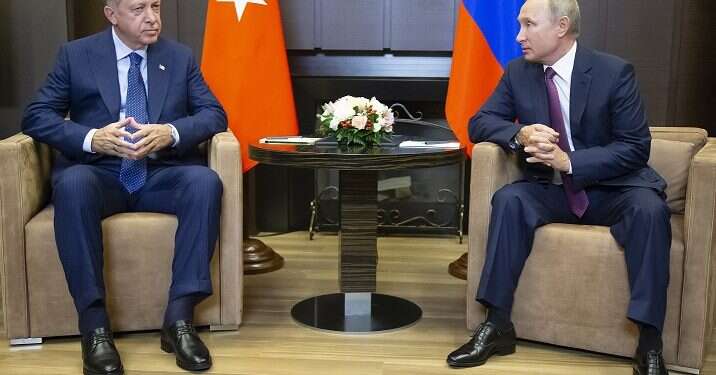Russian and Turkish troops are to enforce a new demilitarized zone in Syria's Idlib region from which "radical" rebels will be required to withdraw by the middle of next month, Russian President Vladimir Putin said on Monday after a meeting with his Turkish counterpart.
Russia, the biggest outside backer of Syrian President Bashar Assad in the seven-year conflict, has been preparing for an offensive on the city of Idlib, which is controlled by rebels and now home to about 3 million people.
But after Putin's talks with Turkish President Tayyip Erdogan, who has opposed a military operation against the rebels in Idlib, Russian Defense Minister Sergei Shoigu said there would not be an offensive now.
Erdogan, who had feared another cross-border exodus of Syrian refugees to join the 3.5 million already in Turkey, said the deal would allow opposition supporters to stay where they were, and avert a humanitarian crisis.
Putin told a joint news conference with Erdogan: "We agreed that by Oct. 15 [we will] create along the contact line between the armed opposition and government troops a demilitarized zone of a depth of 15-20 kilometers [9-12 miles], with the withdrawal from there of radically minded rebels, including the Nusra Front.
"By Oct. 10, at the suggestion of the Turkish president, [we agreed] on the withdrawal from that zone of the heavy weapons, tanks, rockets systems and mortars of all opposition groups. The demilitarized zone will be monitored by mobile patrol groups of Turkish units and units of Russian military police," Putin said, with Erdogan standing alongside him.

Neither Putin nor Erdogan explained how they planned to differentiate "radically minded" rebels from other anti-Assad groups. It was also not immediately clear how much of the city of Idlib fell within the zone.
Idlib is held by an array of rebels. The most powerful is Tahrir al-Sham, an amalgamation of Islamist groups dominated by the Nusra Front, an al-Qaida affiliate until 2016.
Other Islamists, and groups fighting as the Free Syrian Army banner, are now gathered with Turkish backing under the banner of the National Front for Liberation.
"With this agreement, we have precluded experiencing a large humanitarian crisis in Idlib," Erdogan said.
"The opposition will continue to remain in the areas where they are. In return, we will ensure that the radical groups, which we will determine with Russia, will not operate in the area under discussion," he said.
Ahead of the trip to Russia, Erdogan had said Turkey's calls for a cease-fire in Idlib region were bearing fruit after days of relative calm but that more work needed to be done.
Putin this month publicly rebuffed a proposal from Erdogan for a cease-fire there when the two met along with Iran's president for a three-way summit in Tehran.
Syria's U.N. ambassador said Monday that Damascus was committed to "liberate it [Idlib] from terrorism and foreign occupation," adding that there is no de-escalation zone in rebel-held Idlib because "armed groups refused to dissociate themselves from terrorist groups."
Bashar Ja'afari told the U.N. Security Council on Friday that "the situation is as it is now in Idlib because the countries sponsoring terrorism do not want to distinguish between terrorists and armed opposition."
Ja'afari said, "Those who facilitated the entry of foreign terrorist fighters into my country, especially the Turkish government, still have a chance to remove them from Idlib province."
But he warned that "in case the armed terrorist groups refuse to lay down weapons, refuse to leave Syrian territory to go back to where they came from, the Syrian government is prepared."
Ja'afari said Syria is aware of the humanitarian consequences that might result and "we take all precautions and preparations to protect civilians, to provide safe passage for them to leave, just as we have done in similar situations."




